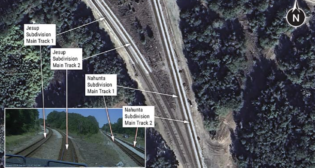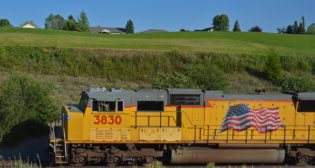
PTC revamp, big trucks in SAFETEA-LU successor
Written by Douglas John BowenThe House Transportation and Infrastructure Committee Wednesday introduced a five-year surface transportation funding bill, a successor to the now-expired SAFETEA-LU, that would extend Congress’ mandated deadline for Positive Train Control (PTC) by five years, from Dec. 31, 2015, to Dec. 31, 2020. It also would revamp the Railroad Rehabilitation and Improvement Financing (RRIF) program--and allow larger and heavier trucks on U.S. highways
As an alternative to installing PTC on significant portions of rights-of-way, the American Energy and Infrastructure Jobs Act also would allow railroads to employ other options to reduce the risk of spills from toxic inhalation hazard (TIH) shipments or similar items, presuming the protection offered was comparable to PTC implementation.
Under the bill, railroads could revise plans plan to reflect lines that are added or removed per their alternative risk reduction strategy, and would submit implementation plan changes by Dec. 31, 2015, a three-year extension.
The National Association of Railroad Passengers (NARP) conditionally endorsed the option, saying it “accepts the need to extend the deadline for implementation of Positive Train Control. But we believe it is vital that the extension include language clarifying that rear-end collisions are to be prevented, which the current FRA rule does not do. We do not accept that the extension should be as long as five years.”
Similarly, the American Public Transportation Association (APTA) voiced cautious support for action by both the House and the Senate concerning renewed funding for surface transportation.
The House T&I Committee bill also outlines changes to the Railroad Rehabilitation and Improvement Financing (RRIF) program to encourage more participation and expedite the loan process. High speed rail projects would be added to the RRIF program, an interesting wrinkle considering the opposition to HSR by many in Congress.
More alarming to many rail interests, including NARP, the Association of American Railroads, the Railway Supply Institute, and the American Short Line & Regional Railroad Association is bill language allowing states to increase truck size and weights up to 97,000 pounds, up from the current 80,000-pound limit. States also could allow double- and triple-trailer trucks to travel over longer distances, as well as permit trucks weighing up to 126,000 pounds to travel on the interstate system for up to 25 miles.
House Committee Chairman John Mica (R-Fla.) described the bill as “the largest transportation reform bill since the creation of the Interstate Highway System in 1956.”
But House Speaker John Boehner (R-Ohio) has made approval of the Keystone XL natural gas pipeline a requirement to passage of any surface transportation bill. President Obama on Jan. 18 formally rejected a bid by Canadian energy company TransCanada to build a $7 billion oil pipeline linking the tar sands of Alberta to U.S. refineries on the Gulf of Mexico.



